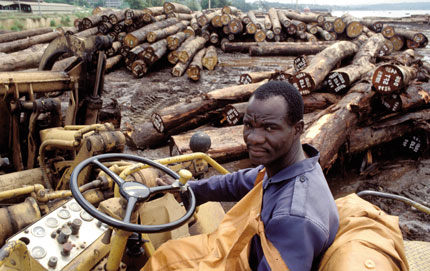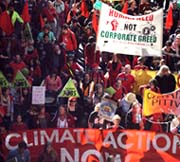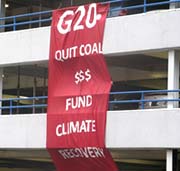
Month: September 2009


The Beekeepers’ Revolution and the Looting of a Small Planet
Source: New Internationalist
For the past two centuries years we’ve been trying to dominate and control the natural world. Beekeeper Philip Chandler argues that it’s time to learn from our mistakes, while we still have time.
 |
|
Destruction in the name of progress: hardwood rainforest logs being stacked for export near Abidjan, Ivory Coast. Photo by Ron Giling / Still Pictures. |
Beekeeping in Europe and North America is no longer sustainable in its present form. We need to re-think our management methods from top to bottom – or face an unprecedented decline in the health and strength of the bee population and the end of honey as a pure, healthy food.

From Pittsburgh to Copenhagen: It’s Time to Act in Defense of the Planet
By the end of this year the world's most influential and powerful individuals will be assembling more than once to discuss the economic and ecological future of the planet. From September 24 through the 25, the G-20 Summit will be taking place in Pittsburgh to address the recent financial collapse and the economic implications of climate change.

Scared Socialist
Remember the panic-inducing headlines of 2008? Government Takes Over Troubled Mortgage Giants, Lehman Brothers Files for Bankruptcy, Bank of America Buys Merrill Lynch, and Stock Prices Plummet - that last one just as the government announced an $85 billion emergency loan to rescue insurance giant AIG. And that was just the beginning.

Actions Spreading Across the U.S. Against Corporate-Driven Climate Policy
Pittsburgh, PA--As groups protest the Pittsburgh International Coal Conference days before the G-20 arrives in the city, additional actions against U.S. climate policy and the fossil fuels industry took place on both the east and west coasts.

US: ‘Rural Brain Drain’ Turns Small Towns Into Ghost Towns
"What surprised us most was that adults in the community were playing a pivotal part in the town’s decline by pushing the best and brightest young people to leave, and by underinvesting in those who chose to stay, even though it was the latter that were the towns’ best chance for a future."
Source: The Chronicle of Higher Education
Civic and business leaders in the places most affected by hollowing out will tell anyone willing to listen how it is their young people, not hogs, steel, beef, corn, or soybeans, that have become their most valuable export commodity. Richard Russo, the Pulitzer Prize-winning observer of small town life, believes that any story of small-town America is, at its core, the story of the people who stay and the ones who go. Yet, what is different at this moment is how, in a postindustrial economy that places such a high premium on education and credentials, the flight of so many young people is transforming rural communities throughout the nation into impoverished ghost towns. A new birth simply cannot replace the loss that results every time a college-educated twentysomething on the verge of becoming a worker, taxpayer, homeowner, or parent leaves. And as more manufacturing jobs disappear every day, the rural crisis that was a slow-acting wasting disease over the past two decades has evolved into a metastasized cancer.
